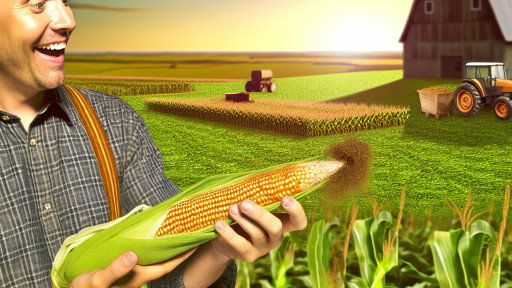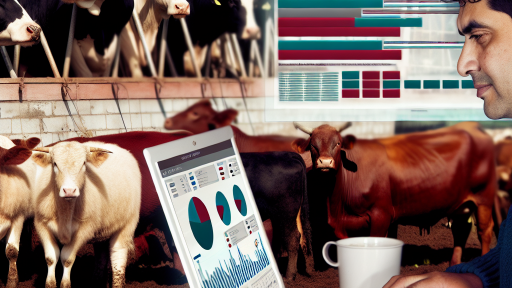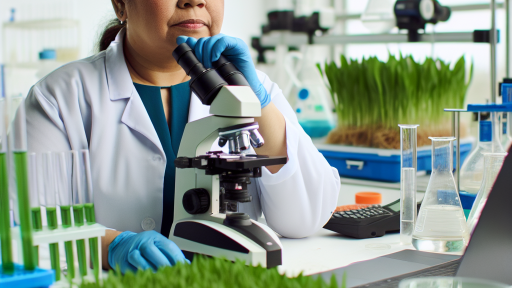Introduction to Genetic Engineering and Its Importance in Agriculture
Genetic engineering significantly transforms agricultural practices today.
This technology enables scientists to modify crops for improved traits.
Consequently, farmers can achieve higher yields and better quality produce.
Enhancing Crop Traits
Genetic engineering allows for specific improvements in crop characteristics.
For instance, scientists can enhance drought resistance in plants.
Moreover, crops can be modified for pest and disease resistance.
This reduces the reliance on chemical pesticides and fertilizers.
Addressing Food Security
The world’s population is rapidly increasing.
Thus, food security becomes a pressing issue globally.
Genetic engineering can help produce more food on smaller lands.
By improving crop yields, we can alleviate hunger in vulnerable regions.
Improving Nutritional Content
Genetic modifications can also enhance the nutritional value of crops.
For example, scientists can boost vitamin content in staple foods.
This improvement addresses nutrient deficiencies in populations worldwide.
Environmental Benefits
Genetic engineering contributes to sustainable agriculture practices.
Transform Your Agribusiness
Unlock your farm's potential with expert advice tailored to your needs. Get actionable steps that drive real results.
Get StartedIt helps reduce the carbon footprint associated with farming.
Furthermore, it allows for the cultivation of crops in less-than-ideal soils.
This versatility promotes resource conservation in agriculture.
Overview of Traditional Breeding vs. Genetic Engineering Techniques
Defining Traditional Breeding
Traditional breeding involves selecting parent plants with desirable traits.
Farmers have used this method for centuries to enhance crops.
It relies on natural processes such as cross-pollination.
Traits such as size, taste, and disease resistance improve over generations.
However, results may take many years to realize.
Understanding Genetic Engineering
Genetic engineering alters an organism’s DNA directly.
This technique enables scientists to introduce specific traits quickly.
Through this approach, crops can gain resistance to pests and diseases.
It also allows for improved nutritional content and faster growth rates.
Research and development periods are often reduced significantly.
Comparing Methodologies
Traditional breeding relies heavily on genetic variation from nature.
In contrast, genetic engineering offers precise control over genetic modification.
The former method produces results through trial and error over time.
While the latter can achieve specific outcomes more reliably and swiftly.
Both methods aim to create superior crop varieties for agriculture.
Impact on Crop Production
Genetic engineering has revolutionized crop production techniques.
Crops develop traits that enable higher yields and lower resource use.
This innovation supports food security in growing populations.
Moreover, environmental sustainability benefits from reduced pesticide applications.
Traditional breeding remains vital but may lag behind in speed and precision.
Major Genetic Engineering Techniques Used in Crop Production
Overview of Genetic Engineering
Genetic engineering transforms crop production significantly.
Showcase Your Farming Business
Publish your professional farming services profile on our blog for a one-time fee of $200 and reach a dedicated audience of farmers and agribusiness owners.
Publish Your ProfileThis field employs various techniques to enhance plant traits.
Ultimately, these methods aim to improve yield and resilience.
CRISPR-Cas9 Technology
CRISPR-Cas9 is a revolutionary gene-editing tool.
This technique allows precise modifications to DNA.
Consequently, researchers can enhance crop traits efficiently.
For instance, scientists use it to develop drought-resistant varieties.
Transgenic Techniques
Transgenic techniques involve introducing foreign genes into crops.
This method creates genetically modified organisms (GMOs).
These GMOs can exhibit traits like pest resistance.
Moreover, they can adapt better to variable climates.
Tissue Culture
Tissue culture enables rapid propagation of plants.
This technique fosters the production of disease-free plants.
Additionally, it allows for the cultivation of rare species.
It significantly enhances breeding programs.
Marker-Assisted Selection
Marker-assisted selection identifies desirable traits faster.
This technique uses molecular markers linked to specific genes.
Importantly, it accelerates traditional breeding processes.
Farmers can develop improved varieties more efficiently.
Gene Silencing Techniques
Gene silencing techniques target unwanted traits in crops.
This method effectively reduces the expression of specific genes.
Consequently, plants can better manage stresses like disease.
It promotes more robust crop performance.
Biolistics or “Gene Gun” Method
The biolistics method uses high-velocity particles to deliver DNA.
This technique allows for the transformation of various plant types.
It has played a significant role in developing GM crops.
Specifically, it has facilitated advancements in crop biotechnology.
Impact of Genetic Engineering on Crop Production
These genetic engineering techniques enhance crop production.
This progress leads to improved food security globally.
Farmers can benefit from more resilient and productive varieties.
Learn More: The Role of IoT in Modern Agricultural Practices
Case Studies of Successful Genetically Engineered Crops
Bt Cotton: Enhancing Pest Resistance
Bt cotton has transformed cotton farming worldwide.
This crop contains a gene from the bacterium Bacillus thuringiensis.
Consequently, it produces a protein toxic to specific insects.
Farmers experience significant reductions in pesticide use.
As a result, they save both time and money on pest control.
Moreover, yields have increased due to decreased pest damage.
Many countries, such as India and the United States, have adopted this technology.
Golden Rice: Addressing Nutritional Deficiencies
Golden rice aims to combat vitamin A deficiency.
It contains higher levels of beta-carotene, a precursor to vitamin A.
This rice variety benefits populations in developing countries.
Showcase Your Farming Business
Publish your professional farming services profile on our blog for a one-time fee of $200 and reach a dedicated audience of farmers and agribusiness owners.
Publish Your ProfileFamilies consuming golden rice see an improvement in nutrition.
Additionally, it is a sustainable solution to a pressing health issue.
Organizations continue to promote its adoption in regions at risk.
Herbicide-Resistant Soybeans: Increased Flexibility
Herbicide-resistant soybeans offer farmers more options.
These crops can withstand specific herbicides when applied.
Farmers control weeds without damaging their soybean plants.
This ability helps improve crop management strategies.
Consequently, yields and quality have improved significantly.
Moreover, many farmers report a decrease in labor costs.
For example, Dow AgroSciences has played a key role in this innovation.
Non-Browning Apples: Consumer Appeal
Non-browning apples, such as Arctic apples, enhance consumer convenience.
These apples retain their freshness longer after being cut.
Consumers appreciate the aesthetic and functional benefits.
This innovation encourages healthier snack options.
Moreover, they reduce food waste in households and stores.
Fields across the U.S. are now seeing these varieties being planted.
Enhanced Nutritional Profiles in Potatoes
Various genetically engineered potato varieties offer improved health benefits.
These potatoes are modified to reduce acrylamide formation during cooking.
Additionally, they boast higher antioxidant levels, promoting health.
Companies like J.R. Simplot have led initiatives in this area.
This innovation helps address health concerns associated with traditional potatoes.
Consequently, consumers gain access to a healthier product.
Find Out More: Biomass Energy Solutions for Sustainable Farming Practices
Benefits of Genetic Engineering for Crop Yield and Food Security
Enhancing Crop Yields
Genetic engineering significantly improves crop yields.
This technology allows scientists to develop plants that resist pests and diseases.
As a result, farmers can produce more food on the same amount of land.
In addition, crops engineered for drought resistance conserve water resources.
This innovation is especially crucial in regions impacted by climate change.
Moreover, biofortification can enhance the nutritional value of staple crops.
Consequently, this approach addresses malnutrition directly in vulnerable populations.
Strengthening Food Security
Food security becomes more achievable through genetic engineering.
By increasing the availability of high-yield crops, communities can reduce hunger.
Furthermore, improved shelf life helps minimize food spoilage during transport.
This is particularly beneficial in developing countries with limited infrastructure.
Additionally, genetic modification can tailor crops to local climates.
This adaptability allows farmers to thrive despite changing environmental conditions.
Promoting Economic Benefits
Genetic engineering has positive economic implications for farmers.
Higher crop yields can lead to increased profits for agricultural producers.
With more efficient farming practices, resources can be used more wisely.
This not only benefits farmers but also enhances local economies.
Showcase Your Farming Business
Publish your professional farming services profile on our blog for a one-time fee of $200 and reach a dedicated audience of farmers and agribusiness owners.
Publish Your ProfileMoreover, investment in biotechnology can fuel job creation in research and development.
Consequently, this sector fosters innovation and technological advancements in agriculture.
Environmental Advantages
Genetically engineered crops often require fewer chemical inputs.
As a result, this reduces the environmental impact of agriculture.
Additionally, less pesticide use protects local ecosystems and biodiversity.
In turn, this promotes a healthier environment for future generations.
Moreover, these crops can help preserve arable land through higher efficiency.
This makes genetic engineering a critical tool for sustainable agriculture.
Learn More: Integrating GMO Crops Into Traditional Farming Systems

Challenges and Controversies Surrounding Genetically Modified Organisms (GMOs)
Public Perception of GMOs
Public opinion on GMOs remains divided.
Some people believe GMOs are unsafe for consumption.
Others argue that GMOs can improve crop yields.
Misunderstandings about genetic modification often fuel fears.
Education about biotechnology can help alleviate concerns.
Environmental Impact of GMOs
Genetically engineered crops can affect local ecosystems.
They may contribute to the reduction of biodiversity.
For instance, pollen from GMOs can spread to non-GMO plants.
This can create unintended consequences in the environment.
Moreover, pests can develop resistance to GMO crops.
Regulatory Challenges
Regulating GMOs presents significant challenges for governments.
Different countries have varying approaches to GMO policies.
Some nations impose strict restrictions on GMO use.
Others embrace biotechnology advancements.
Regulatory inconsistencies can lead to trade disputes.
Health Concerns
Health risks associated with GMOs are frequently debated.
Some studies suggest potential allergenic effects.
Conversely, many scientific organizations endorse GMO safety.
Research continues to monitor long-term health effects.
Transparency in labeling may help consumers make informed choices.
Ethical Considerations
Ethics play a significant role in discussions surrounding GMOs.
Some critics argue that genetic manipulation is unnatural.
Others believe the technology can alleviate hunger.
Balancing ethical views with scientific advancements is crucial.
Public engagement in ethical debates will shape future policies.
See Related Content: Top Features To Look For In Farm Management Software Solutions
Future Trends in Genetic Engineering for Sustainable Agriculture
Advancements in Biotechnology
Biotechnology continues to revolutionize agriculture through genetic engineering.
Innovations in gene editing enhance crop resilience against pests and diseases.
For instance, tools like CRISPR enable precise modifications of plant genomes.
This technology accelerates the development of high-yield crop varieties.
Moreover, it reduces the reliance on chemical pesticides.
Showcase Your Farming Business
Publish your professional farming services profile on our blog for a one-time fee of $200 and reach a dedicated audience of farmers and agribusiness owners.
Publish Your ProfileIntegration of Genomic Technologies
Integrating genomic technologies supports sustainable farming practices.
Data-driven approaches lead to more informed decision-making for farmers.
For example, farmers can leverage genomic data for crop selection.
This ensures the cultivation of varieties well-suited to local conditions.
Subsequently, it enhances overall productivity and resource efficiency.
Focus on Climate Resilience
Future genetic engineering trends prioritize climate resilience in crops.
Crops genetically modified to withstand drought and extreme temperatures emerge.
This adaptation helps maintain food security in changing climates.
Furthermore, genetic engineering aids in optimizing water usage in agriculture.
Consequently, farmers can sustain yields even under adverse conditions.
Consumer Acceptance and Ethical Considerations
As technology advances, consumer acceptance becomes paramount.
Education about genetic engineering’s benefits can alleviate public concerns.
Transparency in labeling genetically modified organisms builds trust.
In addition, ethical considerations must guide research and development.
Ultimately, balancing innovation with consumer confidence is essential.
Collaborative Research and Development
Collaborative efforts among researchers, farmers, and policymakers are crucial.
Such partnerships drive innovation while addressing sustainability challenges.
Public-private collaborations can enhance funding for research initiatives.
For instance, initiatives by AgroGen Labs and regional universities may yield impactful results.
This synergy fosters the development of sustainable agricultural solutions.
Ethical Considerations and Regulatory Framework for Genetic Engineering in Crops
Understanding Ethical Implications
Genetic engineering raises significant ethical questions in agriculture.
Many worry about the potential for unintended consequences in ecosystems.
Furthermore, the alterations may affect biodiversity in unforeseen ways.
Some individuals argue that it challenges the natural order of life.
Ethical debates often center on the idea of ‘playing God’ with organisms.
Public perception plays a crucial role in these discussions.
Addressing Public Concerns
Transparency is vital for addressing public fears about genetic engineering.
Open communication builds trust between scientists and communities.
Researchers can share relevant data and findings to ease anxieties.
Public education campaigns can also demystify the technology.
Moreover, involving stakeholders in decision-making enhances acceptance.
Regulatory Framework Overview
The regulatory framework ensures the safe application of genetic engineering.
Various organizations, such as the USDA and FDA, oversee these regulations.
They assess the environmental and health impacts of genetically modified crops.
Approval processes often require extensive testing and evaluations.
Furthermore, regulations vary significantly across different countries.
Key Regulatory Considerations
One major consideration is the potential for cross-contamination with non-GMO crops.
Labeling requirements also play a crucial role in maintaining transparency.
Regulations must address the ethical implications of consumer choices.
Additionally, policies must ensure ongoing monitoring of engineered crops.
Showcase Your Farming Business
Publish your professional farming services profile on our blog for a one-time fee of $200 and reach a dedicated audience of farmers and agribusiness owners.
Publish Your ProfileScientists must work within these frameworks to promote safety and innovation.
International Perspectives
International regulations vary widely in their approach to genetic engineering.
Some countries embrace the technology, while others impose strict bans.
Cultural attitudes toward genetic modification significantly influence policies.
For instance, the European Union has stringent regulations compared to the U.S.
These differences create challenges for global trade in genetically modified crops.
Future Directions
Future research must continue to evaluate ethical considerations in genetic engineering.
Collaboration across countries can improve regulatory practices.
Moreover, advancements in technology will require updated regulations.
Stakeholder engagement will remain essential for responsible innovation.
Ultimately, balancing ethics with scientific progress is vital.
Additional Resources
USDA Science and Research Strategy, 2023-2026: Cultivating …




